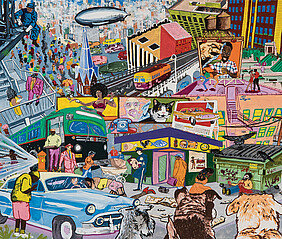The aim of the course is to explore, understand, and critically interpret a range of social and cultural theories of space, as they have been developed and discussed in the fields of the sociology of space and urban studies. The course analyzes space and the city through their reciprocal relationships and interactions with society, with an emphasis on their diverse and often intersecting social, cultural, economic, and political dimensions.
More specifically, the course addresses issues of sociospatial segregation in urban space, from the Chicago School to the present, including the characteristics of urban development in Southern European and particularly Mediterranean cities. Central focus is also given to questions of urban inclusion and spatial appropriation under conditions of migration and more recent refugee settlement, especially from 2015 onwards. The course explores notions of spatial belonging in contexts of mobility, issues of coexistence and encounters with difference, sociospatial inequalities, spatial processes of “othering”, and manifestations of everyday racism in the city. Key topics include diversity, otherness, and inequality, especially in relation to race and ethnicity, class, gender, age, and other axes of difference.
Furthermore, the course discusses aspects of housing and accommodation and their significance in the production of space, both historically and today, with a focus on Greek cities. Contemporary issues such as urban regeneration, gentrification, and touristification are also explored. Broader topics such as spatial claims, urban movements, and theories of the right to the city are central as well. Each theme is accompanied by specific examples and/or case studies in selected cities, aiming to link theory with the analysis of empirical reality. Lectures are complemented by exercises, group readings, and collective critical commentary on various sources.

